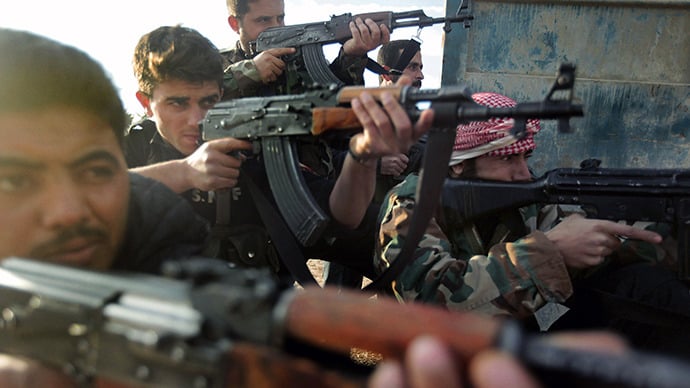 In recent weeks the European Union (EU) arms embargo on Syria had expired, with member states in disagreement as to how they should help the Syrian rebels. This was due to a concerted push by the French and British governments to remove obstacle to the possible armament of the Syrian rebels. Accordingly, questions must be asked as to what is motivating this dangerous course of action, because such action is unlikely to go without its consequences.
In recent weeks the European Union (EU) arms embargo on Syria had expired, with member states in disagreement as to how they should help the Syrian rebels. This was due to a concerted push by the French and British governments to remove obstacle to the possible armament of the Syrian rebels. Accordingly, questions must be asked as to what is motivating this dangerous course of action, because such action is unlikely to go without its consequences.
To begin with, arming the Syrian rebels is a dangerous idea.
While the situation in Syria is rapidly becoming the worst civil war of the 21st Century and the Assad regime already having committed many atrocities, including the alleged use of the deadly nerve agent Sarin Gas, we must not lose sight of the bigger and long term picture. The Syrian rebels are not a singular entity. They often have different priorities and different immediate strategic objectives. Moreover, their visions for a post-Assad Syria are by all accounts very different, if with the same cornerstone – the removal of Assad. The Free Syrian Army (FSA) unfortunately does not exist, or at least not in the form we might expect.
The original FSA was created in 2011 by a one Colonel Riad el-Asaad, but now the FSA has become a label slapped on any rebel group operating within Syria, with most media sources ignoring how disconnected these groups are with the original group or how ideologically different some of them are. A few of these ‘FSA fighters’ are from extremist groups with links to Islamist terrorist groups including Al Qaeda. In late 2012, growing discord was reported between Islamist and Secular rebels, for example, the Saudi-Arabian-funded conservative Islamist ‘Liwaa al- Islam’ rebel group. And now we hear reports of the popularity of the outwardly Al Qaeda affiliated Jabhat al-Nusra and how potential recruits of the more secular FSA groups are being attracted to them.
Why would you want to arm such potentially dangerous groups?
In the case of Libya we have already seen what happens when you rush into arming rebels. It has presented problems in the newly democratic Libya with groups calling for an ‘Arms Free Libya’, with weapons out of unaccountable and dangerous militia’s
This kind of uncertainty over weapons is what we can expect if we arm the rebels. When states arm rebels they release their complete control of who is using them and where they might be utilised – the CIA arming of the Mujahedeen in Afghanistan being an obvious example. Crucially, however, states do not release such control and should not be allowed to distance themselves from the responsibility of such an act. No one can be certain as to what a post–Assad Syria may look like and no one wants to see arms supplied by the United Kingdom fall in the hands of extremist groups or used in reprisals against Shia Muslims, apart from maybe Al Qaeda.
So why do we want to arm these groups and potentially exacerbate the situation?
It is no secret that Russia has been arming the Syrian Government as part of existing contracts, recently confirmed in public by Russian Foreign Minister Sergei Lavrov. Arming the rebels seems to strike a chord with the British sense of fair play, as the UK government believes that arming the rebels would give some kind of parity to the conflict, giving them a more equal footing. This has been part of the decision to force the EU to prematurely lift the arms embargo. Premature because it seems that the UK’s and France’s first priority was to lift the embargo rather than planning out how to arm the rebels in a credible fashion, and consider whether it is even still feasible to do so at this stage of the war, first.
William Hague. the UK Foreign Minister, stated: ‘EU nations agreed to bring the arms embargo on the Syrian opposition to an end. This was the outcome that the United Kingdom wanted. It was a difficult decision for some countries but it was necessary and right to reinforce international efforts to reach a diplomatic solution to the conflict in Syria’.
How can lifting an arms embargo be a way of achieving a diplomatic solution though? The Canadians and Russians in a rare show of unity slammed the decision stating that it would lead to more deaths as the war spreads to the region.
However, Hague also stated that it was important for Europe to send a clear signal to the Assad regime that it has to negotiate seriously, and that ‘all options remain on the table if it refuses to do so’. ‘While we have no immediate plans to send arms to Syria it gives us the flexibility to respond in the future if the situation continues to deteriorate’.
Mixed messages or clever diplomacy? Lifting the embargo may be part of a clever coercive diplomatic strategy in which the UK and others do not really want to arm the rebels, but instead want to be able to issue a ‘gradual turning of the screw’ ultimatum, using the spectre of arming the rebels, backed up by a credible and potent enough threat (hence removing the embargo) that will force Assad to negotiate.
The aim would be to resolve the crisis without resorting to actually arming the rebels or more substantial means. While this undoubtedly forms part of the rationale behind the UK’s strategy in Syria, the UK is also fully aware of the flaws of such a strategy – after all, Assad is unlikely to back down now or negotiate given the intensity and brutality of the war.
Therefore, it is more likely that the UK government genuinely believes that if it were to equip moderate rebels through the Turkish border, it will lessen their reliance on well-armed extremist rebels and that it will help them to eventually defeat Assad. However, victory against Assad depends on the type of weapons given to the rebels, and the UK may be hesitant to provide the more substantial weapons such as surface to air missiles necessary to defeat Assad because they may fall into the hands of extremists. The reality on the ground would therefore be unlikely to change dramatically and may just prolong the conflict. If the UK and her allies do provide the weapons necessary to defeat Assad though, the conflict could still escalate – but this time with the possibility of more advanced weapons falling into the hands of extremist groups.
Needless to say, arming the rebels is a complex issue, although the question that needs to be asked is simple: will arming the rebels end the conflict and prevent more deaths?. The answer for many is no and is why we must continue to problematise the decisions that our political leaders make in order to scrutinise them and hopefully prevent them from simplistic and potentially dangerous action. In short, neither the UK nor any government is entirely sure how they can resolve the crisis in Syria, which is apparent by this dangerous course the UK and France have set upon.
